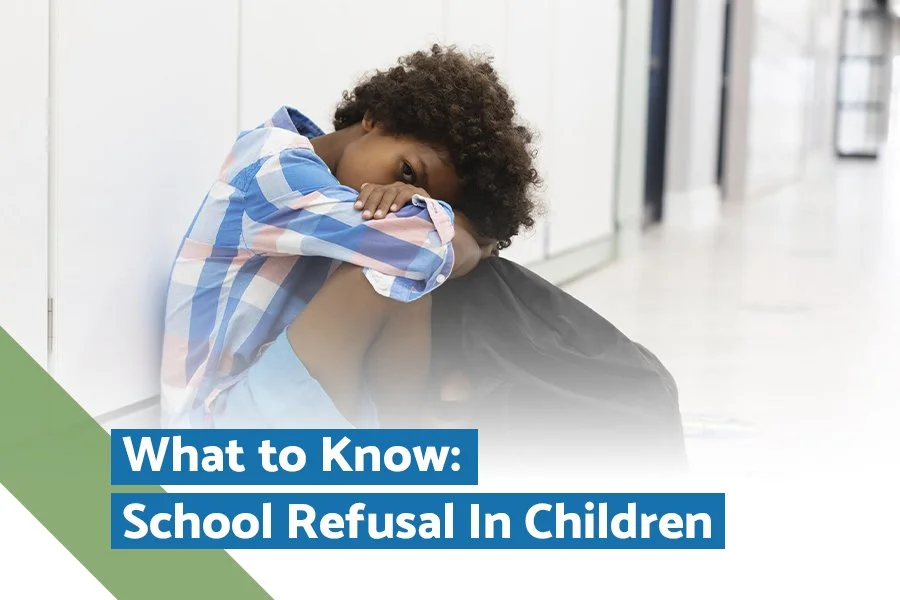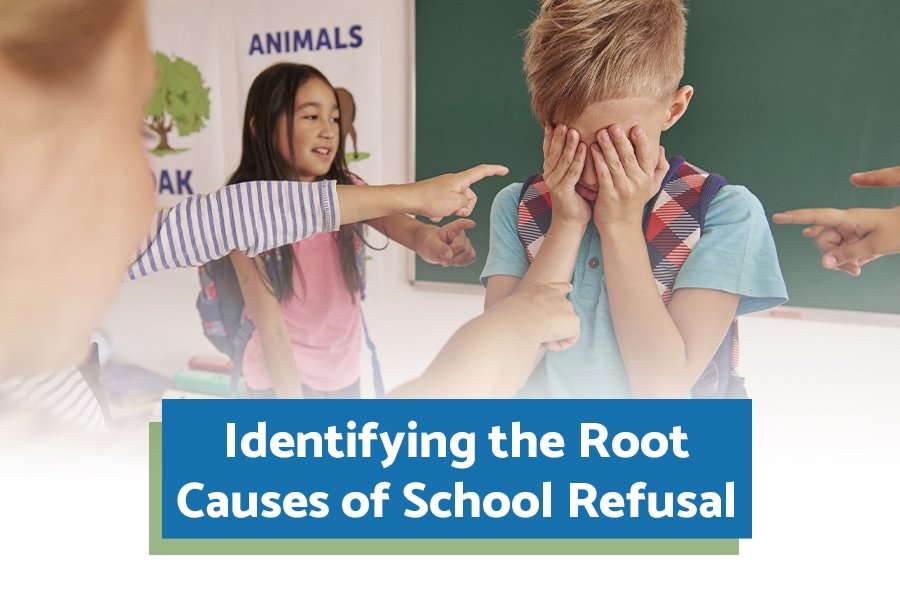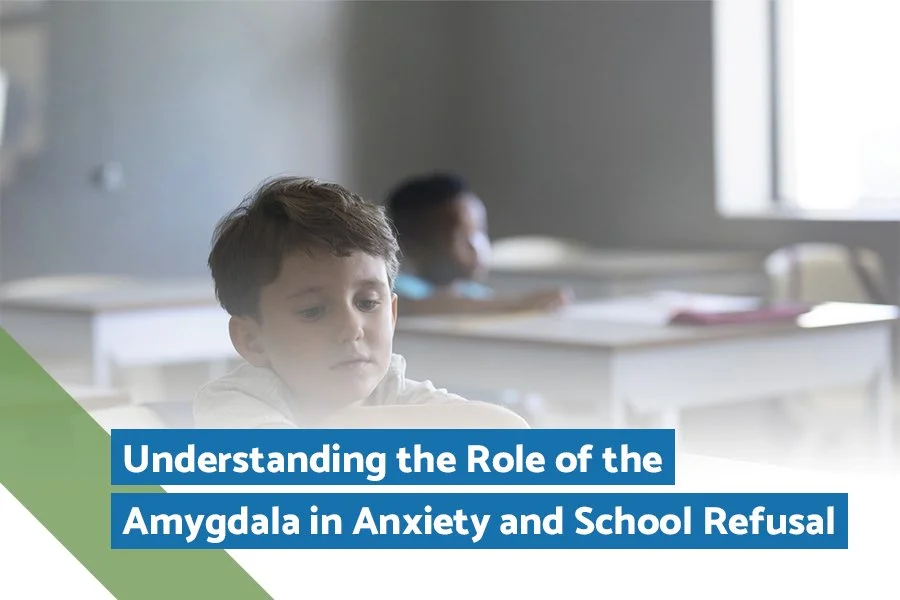Strategies to Help Children Overcome School Refusal
School refusal, a complex issue faced by school-aged children, is characterized by a child’s anxiety or reluctance to attend school, leading to significant absences. Our team at Thriving Minds Behavioral Health shares invaluable insights and strategies honed through years of treating various anxiety disorders.
We offer professional resources for your practice, so you have the tools you need to help children overcome school refusal. Find more resources to broaden your skills and treatment options regarding sleep therapy, selective mutism, and more.
What to Know: School Refusal In Children
School refusal is a pattern of behavior often accompanying anxiety or depression. It manifests in several ways, including absenteeism, skipping classes, chronic tardiness, or lack of participation in class due to anxiety.
Identifying the Root Causes of School Refusal
Understanding the underlying causes of school refusal is essential to effectively addressing and treating it. While each child's situation is unique, certain common factors can lead to anxiety and reluctance to attend school.
Here, we discuss some of the primary reasons behind school refusal, offering insights into how parents and professionals can identify and address these issues.
Bullying
Bullying is a significant and distressing factor that can lead to school refusal. Children who are bullied may fear going to school and facing their aggressors, leading to anxiety and avoidance behaviors.
It is crucial for parents and educators to recognize signs of bullying, such as unexplained injuries, lost personal items, and changes in mood or behavior. Creating a safe and supportive school environment where bullying is promptly addressed is essential for helping affected children feel secure and supported.
Threats to Safety
In today's world, children are increasingly exposed to threats to their safety, including school shootings and active shooter drills. These events can instill profound fear and anxiety, making children hesitant to attend school.
Schools must work to ensure that safety measures and drills are conducted in a manner that minimizes anxiety, coupled with providing emotional support and open communication to help students process their fears.
Separation Anxiety
Separation anxiety, particularly among younger children starting school, can lead to school refusal. This anxiety stems from the fear of being away from family or a familiar home environment.
To combat this, gradual exposure and positive reinforcement can be effective. Parents and teachers can collaborate to create a welcoming and reassuring school atmosphere that eases the transition for anxious children.
Classroom Routine Challenges
Unpredictability or dissatisfaction with classroom routines can trigger anxiety in some students. For children who thrive on structure, inconsistent schedules or activities they find challenging or unenjoyable can create significant stress.
Teachers can help by establishing clear, predictable routines and offering support for students struggling with specific aspects of the school day.
Difficulties with Peer or Teacher Relationships
Changes in peer or teacher relationships can drastically impact a child's willingness to attend school. A supportive and positive relationship with teachers and classmates can significantly enhance a student's school experience.
Conversely, conflicts or lack of support can lead to avoidance. Schools should foster an inclusive, supportive community and offer resources like counseling to help students navigate relationship challenges.
Low Academic Self-Concept
Struggling academically can severely affect a child's self-esteem and motivation, leading to school refusal. Children who feel they are falling behind may become overwhelmed and avoid school to escape feelings of failure.
Parents and educators must recognize signs of academic difficulty and provide appropriate support, such as tutoring or special education services, to help students regain confidence in their abilities.
Work with your clients to identify the root causes of school refusal and take targeted steps to address and mitigate these issues. This is the first step in creating an effective, compassionate strategy for helping them overcome their anxiety and thrive in an educational setting.
Identify the Type of School Refusal
When you know what kind of school refusal the child is displaying, you will know what steps to take next.
Chronic School Refusal
Chronic school refusal describes children who have been absent from school for an extended period, often due to underlying anxiety, depression, or other mental health issues. Addressing chronic school refusal requires a carefully structured, empathetic approach that acknowledges the child's anxiety while encouraging gradual exposure to the school environment.
A staggered, exposure-based approach is often the most effective. This method involves gradually reintroducing the child to school, starting with less anxiety-provoking tasks and slowly building up to full days at school.
Throughout this process, it's crucial to maintain open communication with the child, offering reassurance and support. Collaborating with school staff to create a welcoming and understanding environment can facilitate this reintegration, ensuring the child feels safe and supported upon their return.
Strategies might include the following:
Starting with a partial school day or attending a preferred class only and gradually increasing the child's time at school.
Establishing a clear, predictable routine for school days to reduce anxiety about the unknown.
Utilizing support from school counselors or psychologists to provide on-site assistance as the child transitions back to a regular school schedule.
Acute School Refusal
Acute school refusal typically occurs for a shorter duration, with absences lasting less than two weeks. It might be triggered by a specific event or change, such as starting a new school year, bullying, or a stressful incident at school. In these cases, swift and decisive action can prevent the development of more entrenched avoidance behaviors.
Immediate behavioral interventions are key to effectively addressing acute school refusal. This involves identifying and addressing the specific concerns or fears causing the child's reluctance to attend school. Urge the parents and educators to work together to provide a supportive environment that encourages the child to express their feelings and concerns openly.
Tactics for addressing acute school refusal include:
Immediate reinforcement of the importance of attending school through positive encouragement and, where appropriate, incentives.
Working closely with the child to develop coping strategies for managing anxiety or stress related to school.
Ensuring a supportive return to school by coordinating with teachers and school staff to provide a reassuring presence for the child.
In both chronic and acute school refusal, the goal is to support the child in overcoming their fears and anxieties related to school, enabling them to engage fully in their education. Success relies on a collaborative approach involving the child, their family, and educational and mental health professionals.
Understanding the Role of the Amygdala in Anxiety and School Refusal
The amygdala, a small almond-shaped structure in the brain, is critical in how we process emotions, particularly fear and anxiety. Its primary role is to alert us to potential dangers, preparing our bodies to respond to threats. However, in anxiety disorders, including those manifesting as school refusal, the amygdala can become overly sensitive, triggering anxiety responses in situations that are not actually threatening.
This heightened sensitivity of the amygdala in anxious children can lead to an exaggerated fear response to school-related stimuli. For instance, the thought of separating from parents, interacting with peers, or facing academic challenges can activate the amygdala. This initiates a cascade of physiological and emotional responses that culminate in school refusal behavior.
The Role of Parents and Families
Include parents in the treatment plan to create structure and consistency for the child.
Creating a Structured Home Environment
A structured home environment that mirrors the routines and expectations of school can significantly ease a child's transition between home and school. Parents can establish regular schedules for homework, meals, and bedtime, akin to the school's structure, to instill a sense of predictability and security in their child.
This consistency helps children understand what is expected of them and prepares them mentally and physically for the school day ahead.
Positive Reinforcement
Positive reinforcement is a powerful tool in motivating children to attend school and participate actively in their education. Parents can set up a reward system that recognizes and rewards attendance, effort, and participation.
Rewards don't have to be extravagant; they can be simple acknowledgments like praise, extra playtime, or a favorite meal. The key is to make the rewards meaningful to the child, reinforcing the value of attending school and engaging in learning.
Parent Management Training
Parent management training programs equip parents with effective strategies to support their children through challenges like school refusal without inadvertently reinforcing avoidance behaviors. These programs teach parents how to set clear expectations, use positive reinforcement, and apply consistent consequences for behavior.
By learning these techniques, parents can become a supportive force in their child's education, helping them overcome anxiety and avoidance.
How Schools Can Support Students with School Refusal
Successful reintegration of students with school refusal may require coordinated support from school therapists, counselors, and teachers. Structured interventions, personalized to address each child's specific anxieties and needs, can facilitate a smoother transition back to school.
Regular meetings with school support staff can provide children with a safe space to express their concerns and work through their anxieties.
Accommodations and Adjustments
Schools can make various accommodations and adjustments to the learning environment to help students with school refusal feel more comfortable. This might include adjusting seating arrangements, allowing for breaks when needed, or modifying assignments to reduce pressure.
Flexibility in the cafeteria, playground, and other social settings can also help alleviate anxiety, making school a more welcoming place for anxious students.
Building Personal Connections
Creating a network of supportive relationships within the school can significantly impact a student's sense of belonging and security. Schools can encourage mentorship programs, buddy systems, or small group activities that foster connections between students and between students and staff. Personal connections provide students with a sense of safety and support, encouraging them to engage more fully in school life.
Navigating Beyond Treatment for Education and Empowerment
Addressing school refusal is just the beginning of a journey toward a child's academic and social success. Beyond immediate treatment, ongoing support, education, and empowerment are crucial. Families and schools should collaborate to build resilience, confidence, and coping strategies in children.
Empowering children to face challenges, manage their anxieties, and embrace learning opportunities is essential for their growth into capable and confident individuals. Continuous encouragement, along with opportunities to succeed in various settings, helps children develop a positive self-image and a love for learning that will serve them throughout their lives.
At Thriving Minds, we are deeply committed to sharing our expertise through teaching, training, and consulting within our specialty areas, including strategies to combat school refusal and promote healthy, positive educational experiences. Discover how you can enhance your skills, work alongside us, and make a significant impact in the lives of children and teens.
Learn more about our training and consulting opportunities and take the first step towards empowering yourself and the young individuals you serve. Join us in our mission to create thriving minds across communities







